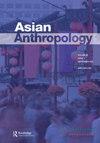Transnational mobility to South Korea among Japanese students: when popular culture meets international education
Q2 Social Sciences
引用次数: 2
Abstract
Abstract Conventional destinations for Asian students have been primarily English-speaking countries, including the US, England, Australia, and Canada, and accordingly, existing literature on mobility among such students has mainly focused on flows from Asia to Western countries. In the last decade, however, South Korea (henceforth, Korea) has emerged as an increasingly popular study abroad destination among Asian students. This newer mobility pattern can be explained in part by their consumption of Korean popular culture in the form of movies, television dramas, and music, that is, the phenomenon of hallyu (the Korean Wave). This report presents a case study of Japanese youth who were inspired by elements of hallyu to study abroad in Korea. It highlights the ways in which Japanese students construed their experience in a transnational era, and illustrates their transformation from consumers of Korean popular culture into cosmopolitan individuals with a global outlook.日本学生到韩国的跨国流动:当流行文化与国际教育相遇
摘要亚洲学生的传统目的地主要是英语国家,包括美国、英国、澳大利亚和加拿大,因此,现有关于这些学生流动的文献主要关注从亚洲到西方国家的流动。然而,在过去的十年里,韩国(以下简称韩国)已经成为亚洲学生中越来越受欢迎的留学目的地。这种新的流动模式可以部分解释为他们以电影、电视剧和音乐的形式消费韩国流行文化,即韩流现象。本报告介绍了一个日本青年的案例研究,他们受到hallyu元素的启发,前往韩国留学。它突出了日本学生在跨国时代理解自己经历的方式,并说明了他们从韩国流行文化的消费者转变为具有全球视野的国际化个人。
本文章由计算机程序翻译,如有差异,请以英文原文为准。
求助全文
约1分钟内获得全文
求助全文
来源期刊

Asian anthropology
Social Sciences-Anthropology
CiteScore
1.60
自引率
0.00%
发文量
25
期刊介绍:
Asian Anthropology seeks to bring interesting and exciting new anthropological research on Asia to a global audience. Until recently, anthropologists writing on a range of Asian topics in English but seeking a global audience have had to depend largely on Western-based journals to publish their works. Given the increasing number of indigenous anthropologists and anthropologists based in Asia, as well as the increasing interest in Asia among anthropologists everywhere, it is important to have an anthropology journal that is refereed on a global basis but that is editorially Asian-based. Asian Anthropology is editorially based in Hong Kong, Taiwan, and Japan, but welcomes contributions from anthropologists and anthropology-related scholars throughout the world with an interest in Asia, especially East Asia as well as Southeast and South Asia. While the language of the journal is English, we also seek original works translated into English, which will facilitate greater participation and scholarly exchange. The journal will provide a forum for anthropologists working on Asia, in the broadest sense of the term "Asia". We seek your general support through submissions, subscriptions, and comments.
 求助内容:
求助内容: 应助结果提醒方式:
应助结果提醒方式:


